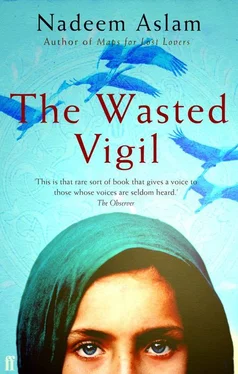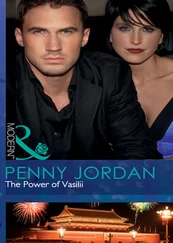Nadeem Aslam - The Wasted Vigil
Здесь есть возможность читать онлайн «Nadeem Aslam - The Wasted Vigil» весь текст электронной книги совершенно бесплатно (целиком полную версию без сокращений). В некоторых случаях можно слушать аудио, скачать через торрент в формате fb2 и присутствует краткое содержание. Год выпуска: 2009, Издательство: Faber and Faber, Жанр: Современная проза, на английском языке. Описание произведения, (предисловие) а так же отзывы посетителей доступны на портале библиотеки ЛибКат.
- Название:The Wasted Vigil
- Автор:
- Издательство:Faber and Faber
- Жанр:
- Год:2009
- ISBN:нет данных
- Рейтинг книги:4 / 5. Голосов: 1
-
Избранное:Добавить в избранное
- Отзывы:
-
Ваша оценка:
- 80
- 1
- 2
- 3
- 4
- 5
The Wasted Vigil: краткое содержание, описание и аннотация
Предлагаем к чтению аннотацию, описание, краткое содержание или предисловие (зависит от того, что написал сам автор книги «The Wasted Vigil»). Если вы не нашли необходимую информацию о книге — напишите в комментариях, мы постараемся отыскать её.
The Wasted Vigil — читать онлайн бесплатно полную книгу (весь текст) целиком
Ниже представлен текст книги, разбитый по страницам. Система сохранения места последней прочитанной страницы, позволяет с удобством читать онлайн бесплатно книгу «The Wasted Vigil», без необходимости каждый раз заново искать на чём Вы остановились. Поставьте закладку, и сможете в любой момент перейти на страницу, на которой закончили чтение.
Интервал:
Закладка:
Piotr Danilovich’s responsibility at the sacred House of Ten Thousand Christs was to repair damaged images, his fingers smeared with resin and ink and pigment, dissolved gold under his fingernails. There was a period during the Soviet rule when the great mosque at Leningrad was turned into a weapons depot. And so wheat was stored at the monastery during the Soviet years, the icons rotting away out of neglect in the back rooms, being eaten by rats.
‘How did you find me?’ he asked.
‘My husband, Stepan Ivanovich, was in the military. One of his friends told me about you, about the story — or rumour — that you had tried to defect with Benedikt but had changed your mind and returned.’
‘You say your husband was in the military. Has he left?’
‘He died this time last year.’
‘So you are the wife of that Stepan Ivanovich.’ His voice remained low throughout her visit and he kept his head very still when he talked.
Three officers had been put on trial for killing prisoners in Chechnya, torturing those suspected of being guerrillas or supporters of the rebellion against the Russian government. Stepan Ivanovich had served as character witness for two of them. If we have in our custody someone who knows where a suitcase full of explosives is planted, set to go off in a few hours, but who refuses to talk, do we not have the right to hurt him into revealing the information — burn him, freeze him? This would have been his line of defence.
‘I am sorry for your loss,’ Piotr said.
She had nodded, looking out at the snow lying in front of the building, then turning to him. With his thinness, and the darkness of his eyes, he seemed to her a figure stepped out of the margins of one of the icons, aged beyond his years.
The pomegranate was on a table close to the fireplace.
She slit it open now. The outer layer of scarlet seeds had been warmed by the flames. The temperature of menstrual blood, of semen just emerged from a man’s body.
‘Afghan fruit vendors would sometimes inject poison into the oranges, melons and pomegranates they sold us Soviet soldiers.’
*
The orchard is a lace of linked greenery around them as Marcus and Lara walk between the trees in the morning. A paw of mist comes down from the mountains above the house.
Marcus inhales the green scents of the spring morning. ‘One year when we visited England there was pollen everywhere, everything coated yellow. A wet April followed by a dry May had caused the pollen cloud to float over to eastern England from Scandinavia. It was thirty years ago but I remember it suddenly now.’
‘Stravinsky in his seventies remembered for the first time the smell of the St Petersburg snow of his childhood.’
‘Is it something distinctive?’
‘Unforgettable. Benedikt mentioned it in one of his letters home.’
There are butterflies in the trees around them. Some have green underwings so that — visible invisible visible invisible — they seem to blink in and out of existence as they fly amid the leaves.
‘Look there, Lara. That tree with pink blossoms.’
She comes and stands beside him. ‘It’s as though lightning struck it.’
‘Qatrina did that. A man from Usha kept making his wife pregnant year after year. The young woman was twenty-two and had had seven children in six years. He never allowed her body to recover, despite warnings and pleadings from Qatrina. When he brought his wife to us for an eighth time, she was almost dead. The tree was small then, a sapling, but still rather robust, and while I was trying to stabilise the woman, Qatrina came out here. In giving vent to her rage she tore the young apricot plant in two. It’s possible she wanted to break off a branch to thrash him.’
They look at it where it is split down the middle. The pink splash-pattern of its flowers.
About five years ago Lara herself had failed yet again to carry a pregnancy to full term. For a Russian woman an abortion was one of the more obvious options when it came to birth control, the men not agreeing to consider any preventative methods themselves, and the ones Lara had had in her youth had damaged her.
‘You mustn’t think badly of Qatrina from what I have just told you.’
‘Of course not.’
‘Women were always dying in repeated childbirth because the husbands didn’t listen — Qatrina had to struggle with the mosques because they said birth control was the West’s attempt at reducing the number of Muslims in the world. And then the Communist regime came and closed down the family planning centres, saying they were an Imperialist conspiracy to detract attention from the real causes of poverty.’
Last month in Usha he overheard a child of about seven say to another, the pair obviously at a loss for something to do, ‘Or shall we go and throw stones at the grave of Qatrina?’ Marcus wishes he hadn’t heard it, had heard it inaccurately.
She used to say she did not want any mention of God at her funeral.
They move towards the tree through the sunlight. Easy to imagine, at such an hour, how Qatrina could have filled notebooks with the colours she found in a square foot of nature. An olive grove outside Jalalabad — grey, white, green . A mallow blossom — red orange, sulphur, yellow bone, red-wine shadow . The mountains above the house — silver, evasive grey, blue, sapphire water . She’d use these notes as reference when painting. Muhammad had said, ‘Verily there are one hundred minus one names of Allah. He who enumerates them would get into Paradise,’ causing Muslims to search them out in the Koran so that a list was compiled. And Qatrina’s life’s work was a series of ninety-nine paintings concerning these names — ‘the Artist’ among them. They are now lost because of the wars.
‘She worked with the patients for longer hours than I did,’ Marcus says. ‘Travelled to remoter areas than I ever contemplated whenever she heard about an outbreak or epidemic. But she would at times feel utterly helpless at the state of her country’s people.’
‘I am surprised the tree has survived.’
‘It even produces some fruit, later in the year.’
‘Then I won’t get to taste it. A few more days, at most, is all I’ll spend here.’
‘If you are in no hurry to get back to something, you can stay here longer. And I’ll talk to David so we can accompany you to Kabul airport, we’ll try to walk right up to the plane, when you do decide to go.’ The night she had spent alone in the house has deposited the blue of fearful anxiety under her eyes.
‘There is no need,’ she shakes her head but then murmurs a thanks.
*
For the next three days, David leaves for Jalalabad early each morning, the song of the birds entering his ears like gentle pins, and he returns to the house in the evenings. The electricity generator is actually broken, he discovers, and he takes it to Jalalabad to be mended, the house continuing to live by candle- and lamplight, moving between weakly illuminated pools.
One morning there is a demonstration in Jalalabad, the placards and shouts expressing contempt for the people who had planned and carried out the bombing of the school. Pakistan’s government has denied suggestions that current or former members of its secret service were involved in the crime. Another day, the weeping father of one of the eleven dead children insists the Americans leave Afghanistan because if they had not come the atrocity would not have occurred. And a woman, broken with grief at having lost a girl and a boy, approaches David and wants to know why the Americans had released that criminal from custody. She demands they catch his accomplices and take them away to be slowly tortured to death somewhere.
He sits on the stone steps that descend into the perfume factory. As night arrives he can barely see the Buddha’s head, save for slashes of minimum light that define his hair and mouth. He spreads ambergris onto his hands. His head filling up with sea odour. He discovered a small amount of it in a jar here like a dab of black butter. It is obtained from the insides of sperm whales but the Arabs who peddled it along the Silk Road always disguised its origins, protecting a trade secret. For a long time the Persians believed that it came from a spring beneath the oceans, and the Chinese that it was the spit of dragons.
Читать дальшеИнтервал:
Закладка:
Похожие книги на «The Wasted Vigil»
Представляем Вашему вниманию похожие книги на «The Wasted Vigil» списком для выбора. Мы отобрали схожую по названию и смыслу литературу в надежде предоставить читателям больше вариантов отыскать новые, интересные, ещё непрочитанные произведения.
Обсуждение, отзывы о книге «The Wasted Vigil» и просто собственные мнения читателей. Оставьте ваши комментарии, напишите, что Вы думаете о произведении, его смысле или главных героях. Укажите что конкретно понравилось, а что нет, и почему Вы так считаете.












